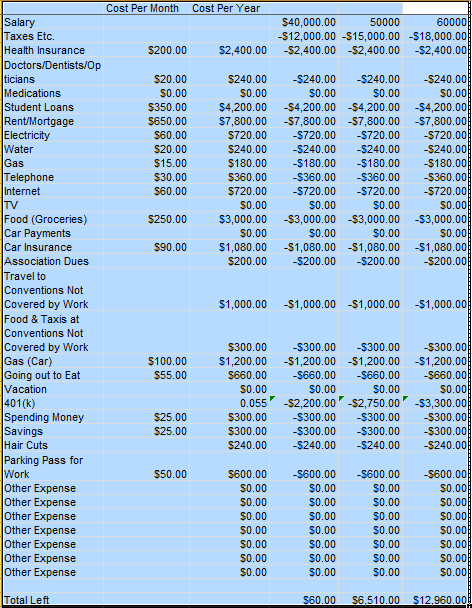
*Disclaimer: It’s been many years since I served on a search committee, but, like most people who’ve managed I know what I like, what I would look for, and I have my own pet peeves. With the exception of the first link the advice below will apply to pretty much any discipline.
It’s stressful looking for a job and, for me, more information = more relaxed and confident. (My friends can stop snickering now, yes I tend to over prepare whenever I’m not sure about what I’m doing, it makes me feel better, deal with it.
I’m pleased to present a curated list of links containing advice and resources for job seekers. If what’s here doesn’t whet you appetite, check out my other posts for phone and in-person interview advice, as well as general job search advice and resources (Tips From the Experts: Interviewees & New Workers, Tales from the Tenure Track: Cost of Living, Tales from the Tenure Track: Negotiating Your Hire Package, Job Resources for Library School Students & Librarians, Keeping Up Professionally: For Library School Students).
You want to work in libraries? Essential Careers Advice for New Professionals by Ned Porter
(The blog under this author is now defunct so I disabled the link. Someone else seems to have taken over and their posts have the same links but different content.)
Ned gives a lot of good advice in this post which includes detailed explanations of why you should take his advice. I highly encourage all library school students to read it, highlights include:
1. Work *really* hard.
5. Proactively anticipate your career needs.
6. Join a professional body.
7. Acclimatize to the fact that this is a people profession.
13. Diversify. There is no career ladder in this industry; think of it as a career climbing wall.
Why You Didn’t Get An Interview by K. G. Schneider
http://freerangelibrarian.com/2011/08/07/why-you-didnt-get-an-interview/
Ranging from reasons that have nothing to do with you, to things you can improve on this post is full of honesty, humor, and excellent advice. My favorite piece of advice is TJMS otherwise known as The Job Market Sucks. With so many people applying for so few jobs it’s important to remember that there are a lot of reasons why you may not be getting the interview, or the offer, and many of them have nothing to do with you or anything that you did.
2011 Most Overused Buzzwords in the US on Linked In via Market Watch
(This site is now defunct so I disabled the link.)
Overused buzzwords change on an annual basis, one person uses a word or a phrase, other people think it sounds good and the next thing you know everyone’s resume starts to look the same. I’m not sure that I agree that you can never use these words, but it’s definitely a good idea to minimize as many of them as possible so that your resume or C.V. stands out as much as possible.
10 unusual interview mistakes, and 6 that are all too common via the Chicago Tribune
http://articles.chicagotribune.com/2012-02-23/classified/chi-job-interview-mistakes-20120223_1_job-interview-mistakes-candidate
This post starts with a bunch of uncommon interview mistakes and then goes straight for the jugular. Of the six most common job interview mistakes I think that appearing disinterested in the position is the worst mistake you can make. If you don’t seem interested in the position I can’t imagine anyone offering you the job. You don’t have to be bouncing off the walls with joy at the thought of the job but it’s really important to convey interest in the job during the interview, you can do this in several ways, you can mention a program that you’d like to work with, or suggest a new service to explore. Other common mistakes can be difficult to combat, it’s hard to know what people will consider appearing arrogant, and it can be difficult to explain why you are leaving your previous employer without talking negatively. Thinking out and practicing your explanations if you have left, or are trying to leave, a bad work situation is key to not blowing the interview.
Interview Red Flags by Joe Hardenbrook
http://letterstoayounglibrarian.blogspot.com/2011/12/interview-red-flags-by-joe-hardenbrook.html
An interview isn’t just about you making a good impression, it’s the chance for the organization to put their best foot forward and convince you that they are a good place to work. This post provides a wealth of questions to ask and clues to watch for so that if you do get the job offer you can accurately assess whether you?ll be able to make a go of it. Joe sums it up nicely with the phrase, “Small Things Matter. Think about people that you’ve lived with, it isn’t usually the big things that drive you crazy, it’s the little things like where they leave their jacket, how they load the dishwasher.” Make sure your potential new job won’t drive you crazy, especially if you have to move for the job! Moving is way too expensive to do for a job you know you’re going to want to quit as soon as possible!
Ace Your Skype Job Interview by Amy Levin-Epstein
(This site is now defunct so I disabled the link.)
It’s important to realize that Skype is a completely different medium to interview in than meeting with people in person or just talking over the phone. This article has a lot of great tips ranging from what not to do to video interview essentials. The one piece of advice that I was really glad to see was don’t wear stripes, next time you’re watching TV try and look at someone who’s wearing stripes, they tend to look a little wavy because of how our eyes interpret the digital image, you don’t want to distract people by looking wavy on camera. And, as always, test the technology before hand. That won’t guarantee that no one has a technical problem the day of the interview but at least you’ll know you’ve done your best to be prepared for any eventuality.
Negotiating Tactics for Women from the Chronicle of Higher Education
http://chronicle.com/blogs/onhiring/negotiating-tactics-for-women/29883
Although this advice is targeted at women it is also good advice for people who are shy, introverted, or just plain nice people who don’t want to be a bother and believe the world should be a fair place. Negotiating is always uncomfortable but if you don’t negotiate chances are you’ll never be paid what you’re worth, not because people aren’t willing to pay but because their job is to get the best people possible for the least amount of money.? Make sure you know what the constraints are, for example if you’re in higher ed there is no way you’re going to get paid at the associate professor level if you’re a assistant professor, and then give it a try in a respectful and non-confrontational manner.
JIBE: Find Jobs Based On Your Social Connections
(This site is now defunct so I disabled the link.)
This is a new website that you may want to try out, here’s the blurb from the site:
Reverse the model and let candidates ask for referrals as part of the application process on your career site. Get Referred integrates seamlessly with your existing applicant tracking system (ATS) or employee referral platform. By leveraging Facebook and LinkedIn in the application flow, candidates can see who they know at your company and request a referral directly from your career site.
It’s a bit early to see if this service will take off but any referral is better than no referral. If you do decide to go for it be sure and scrutinize their terms of use and think very carefully about connecting Facebook before signing up, we all have different comfort levels of sharing and a service like this won’t be for everyone.
Hot to Get the Most Out of Studying by Dr. Stephen L. Chew, Samford University
http://www.samford.edu/how-to-study/
Consider this my version of an Easter Egg hidden in this post. I really wish I’d had the benefit of this advice as an undergraduate, over time I learned some of these techniques through trail and error. Rather than reinvent the wheel I highly recommend that you take a look at this series of short videos, see if there’s anything of value to you, and if there is share them with your classmates or students. Sometimes the hardest part of learning is figuring how to study effectively.
Please share your favorite job search advice or resource(s) in the comments :)

